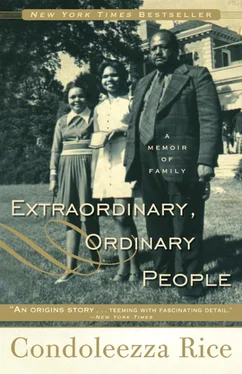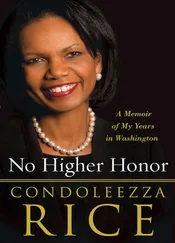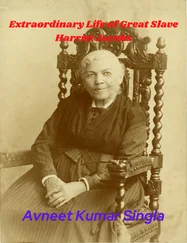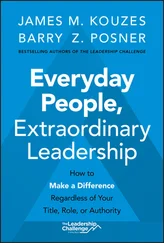Q. In “My Rookie Season,” you write about the importance of seeking out mentors regardless of whether they share one’s background (“Sally Ride never would have been an astronaut if she had waited to see a female in that role”). Do you continue to have mentors, or are they just for rookies?
A. One is never too experienced to have mentors, and that is certainly the case for me. I was blessed throughout my professional life to have a number of individuals whom I admired and who gave me opportunities to succeed. Josef Korbel, my advisor at the University of Denver, inspired my passion for Soviet affairs and international politics more generally. Brent Scowcroft, the nation’s National Security Advisor under Gerald Ford and George H. W. Bush, mentored me in my early years in government and ultimately became the model I sought to emulate when I myself held that office.
Today, I admire deeply my mentor and close friend George Shultz, who served as the nation’s sixtieth Secretary of State under President Ronald Reagan. In addition to his diplomatic prowess, business acumen, and intuitive wisdom on leadership and negotiation, I admire George for his willingness to invest in me at a time when I was just an assistant professor. His guidance and friendship is something that I continue to treasure to this day.
Q. Educational institutions across all levels—from public elementary schools to higher education—are once again facing serious budget shortfalls. What advice do you have for decision makers who have to make the kinds of tough choices you made as provost of Stanford?
A. We as a nation cannot continue to accrue budget deficits by throwing money at the problem. When I first became Stanford’s provost, the university was facing a budget deficit of about five percent. Given that I was responsible for budgetary matters, I consistently reminded my colleagues that, unlike the federal government, I could not print money and that the university would have to live within its means.
We need innovative solutions to improve K-12 education, and I currently co-chair a task force on education at the Council on Foreign Relations that is working to develop such options. From my perspective, one of the most effective ways to drive innovation in education will be to increase “competition” among schools and educators in ways that will benefit our students. This requires that we increase opportunities for parents of all socioeconomic backgrounds to choose the schools they feel most appropriate for their children. By enhancing school choice, principals and educators could be driven through funding incentives to demand higher performance from their teachers. Teachers, in turn, should be rewarded for effectiveness in their teaching, not merely the length of time they have spent in front of a classroom. Although I am an ardent defender of the tenure process at the university level, I believe that the tenure system at the secondary level does not adequately reflect a merit-based approach and consequently does not serve our students.
Q. When you were a young American, you faced obstacles of race, gender, unequal education, and parents who had to work long hours to build a middle-class life. What do you think the greatest obstacles and challenges are for young Americans in the twenty-first century?
A. We are facing a real crisis in this country when I can look at a child’s zip code and tell you whether he or she is going to get a good education. As growth in the world’s economy continues to demand more skilled workers, the United States risks falling behind other nations in maintaining even basic literacy and arithmetic proficiency among our children. Nearly one in four students who take the U.S. military’s entrance exam do not pass, given the poor state of our country’s educational system. The crisis in K-12 education is truly the greatest national security challenge this country faces.
Compounding this issue is what President George W. Bush has called “the soft bigotry of low expectations” that is preventing underprivileged and minority students from reaching their full potential. The widening achievement gap in our country threatens to leave behind an entire generation of students because of an implicit and patronizing bias that suggests their dire circumstances simply make it impossible to help them succeed. We are failing to deliver for these students the basic promise of equality of opportunity that is vital to the American experience. Without that, America will have lost its core principle that makes our country the envy of the world.
Q. What did segregation as well as Cold War politics teach you about leadership? What leadership lessons can a reader gain from Extraordinary, Ordinary People?
A. Among the most important lessons I learned from my experiences enduring segregation and observing the unraveling of the Soviet Union were the importance of vision in leadership and the universal aspirations of all people for freedom. Leaders in both the Civil Rights movement and the Cold War succeeded in part because they articulated bold visions of what a world should look like after segregation barriers fell and the Berlin Wall crumbled. It would have been easier to cave to expectations that segregation would not end in my lifetime or that Germany would not unify for more than one hundred years. And yet, because of the bold visions of our leaders, Germany unified in two years to become one of Europe’s strongest economies, and the United States elected its first African American to be president of the United States soon after two African Americans had served as Secretary of State.
Additionally, these experiences reinforced for me the idea that freedom is a universal aspiration. I often recall how my father was unable to register to vote in the South. Segregationists had long considered blacks too “childish” to participate in politics. Similarly, Soviet leaders assumed they knew what was best for their people by imposing the strong hand of communism to redistribute wealth and opportunity in a bankrupt vision of equality. Any illusion about the aspirations of people in Eastern Europe and the Soviet bloc were wiped away by the hundreds of thousands of impatient patriots protesting in squares and staring down Soviet tanks as they clamored for democracy. This same spirit—this universality of freedom—has driven Arabs into the streets today to topple authoritarian regimes. These experiences have reinforced for me the importance of leaders to stand for the proposition that every man, woman, and child deserves to live in freedom.
Q. Your book poignantly describes the constant support you, John, and Angelena provided one another. Who are the members of your support team these days?
A. I continue to be blessed with close family and an extraordinary group of friends. Since leaving office, I have reestablished my life in northern California and reconnected with many of the individuals mentioned in these pages. I often spend the holidays with my aunt Gee, and my cousin Lativia and her husband, Will, have recently moved close to me in the Bay Area. I am also extraordinarily fortunate to have resumed my professorship at Stanford, where I have the great privilege of teaching and interacting with students. Their vitality and intellectual curiosity renew my faith in the promise of the next generation that will serve our country.
Q. Will your next book pick up where this one leaves off?
A. My next memoir will indeed resume where Extraordinary, Ordinary People left off and reflect on the foreign policy decisions I helped shape during a consequential period in our nation’s history. I hope that once the memoir is published, readers will find it as informative and engaging as the book they currently hold in their hands.
Читать дальше












